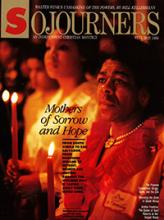At that very hour some Pharisees came, and said to him, "Get away from here, for Herod wants to kill you." And he said to them, "Go and tell that fox ..."
-- Luke 13:31-32
The white government of South Africa had just outlawed the activities of 17 organizations, including the two-million-member United Democratic Front, which have been leading the struggle against apartheid. At the same time, the nation's largest labor federation, the Congress of South African Trade Unions (COSATU), was prohibited from all political activity. The meaning of the actions was clear: Any opposition to the white regime would no longer be tolerated; peaceful protest against apartheid was ordered to stop.
Twenty months of the government-imposed state of emergency had seriously crippled anti-apartheid groups, with many members suffering detention, police violence, and death. The government's forced exile of the media from the black townships and other conflict areas had effectively turned out the lights to keep the rest of the world from seeing what was happening in South Africa.
With the events of the last week in February, the consolidation of totalitarian rule and a virtual police state was complete. Such effective government repression created a state in which there would be no one left to protest.
Read the Full Article

